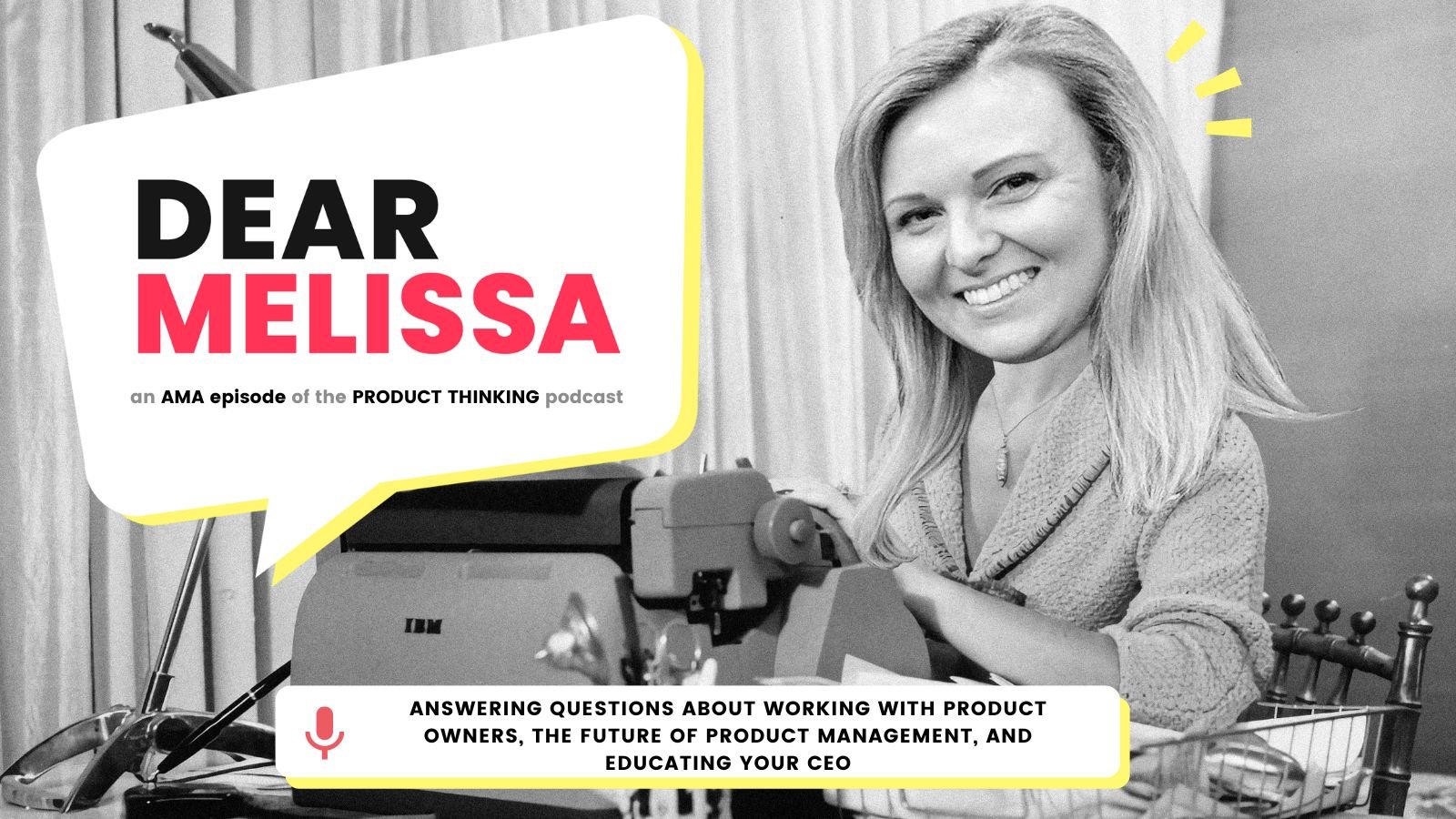Episode 107: Answering Questions About Working with Product Owners, The Future of Product Management, and Educating Your CEO
In this Dear Melissa segment, Melissa Perri answers subscribers’ questions about how product managers and product owners should work together, product management trend predictions and what the future of product might look like, and what to do when your CEO is misdirecting blame towards product management.
Have a product question for Melissa? Submit one here and Melissa may answer it in a future episode.
Subscribe via your favorite platform:
Q: You've been involved in product management for a while, and I would love to see where you feel the evolution of product management is headed.
A: I think it's really hard to talk about where PM is going because it's still not fully functioning in many companies yet…I'll tell you some of the trends that I am seeing though.
Q: My organization is scaling and now we have product managers and product owners. How should we work together?
A: You know that I’m not a fan of the split of product managers and product owners- here’s why.
Q: Our CEO is putting the blame on product management because not as much as we want is being delivered.How can we change the perception that product management is the cause without throwing our devs under the bus?
A: We're going to start from a place of everybody is trying their best. You need to educate the CEO about what the problems are and you need to do that as a united front. Here’s how to do that.
Resources
Melissa Perri on LinkedIn | Twitter
MelissaPerri.com | CPO Accelerator
Transcript:
Melissa:
Hello and welcome to another episode of Dear Melissa. Well, you made it through January. Why does January always feel like a year in itself? That month just drags on, but we made it and now the rest of the year is gonna fly by. I'm sorry to tell you, but that is how it works every single year. Well, I hope you are swimmingly getting through your Q1 today. We're gonna have a couple questions for you on this episode of Dear Melissa about product management versus product owner, which is, I know I've answered a couple times, but we're still talking about it, so I will still talk about it. Um, we also have another question about where PM is going in the future. How is this job going to keep going? And then finally we're gonna close it out about what happens when the CEO is putting blame on the product management team for not delivering when it's not actually their fault. So how do you approach that as a head of product? Great questions, and let's kick off with our first one. Let's go to the phone lines and talk about where is product management going.
So I think it's really hard to talk about where PM is going because it's still not fully functioning in many companies yet. So to say where it's going long term, you know, we gotta get most people caught up to where it should be now. But I'll tell you some of the trends that I am seeing and what I'm looking at at companies who do it well and how they're evolving this practice as well. So when I look at, um, things like behavioral product managers like you're talking about, I think that's just a fancy term for product managers that understand customers better. I don't think it's a different role, but what I do see happening is that product managers tend to specialize in different areas based on their experience or what they like working on. So, um, this is very prevalent when we're trying to hire more senior product managers or product managers.
Um, you know, in the C-suite, which are chief product officers, you can kind of see specializations, for example. There are people that concentrate in b2b and then there are people who concentrate in b2c. Now, as I said on a previous Dear Melissa, the tool set, you know, our basic principles of product management are the same, but our tool sets are different. And as you hone those over years, you might get extremely good at a certain tool set for product management like b2c, which is all really like growth oriented. So that's where you start to see people put these taglines on product management, like behavioral product manager, we'll also see growth product managers, um, we'll see technical product managers, we start to classify them. At the end of the day, these are not very different jobs, they're both product managers, but you do specialize in what you're really good at and what you have knowledge on.
So for example, you might be building a, um, B2B workflow application in a highly specialized industry like healthcare or something like that. I'm gonna look for a product manager that has really good user experience knowledge. They understand the importance of it, they understand what good UX looks like, and then maybe I also need one that has some domain expertise. So I'm still looking for a core set of product management skills, which is like your product management 1 0 1 type stuff. But I might be looking for specializations or background domains that would help them succeed in here. And that's what I'm seeing more and more and where this is going in the future. I don't think we're going to get rid of product management or it's going to evolve into something else, but I do see it becoming more specialized in different industries and that is happening today in companies that are even doing product management well.
So it's really about finding the right fit for your company with somebody who has a very specific, not specific, somebody who has a generalized product management skillset and then has some specifics on top of it. It's the same thing for developers too, right? You're not going to hire an AI developer to go work on something that's like not AI they specialize at, but we do have general development stuff that person could probably develop in a couple languages if they know them, but they specialize in different areas or where they wanna get into. It's the same with product management. I think that we'll see that more and more come out there right now. I think there's a lot of confusion about, is this the same thing as a normal product manager?
Is a B2B product manager, is it the same role as a growth product manager? Still need the same toolbox, still need the same skillset, you're just gonna be specializing in different things where you wanna spike. So that's how I think PM is evolving. I also do see it becoming, um, more accepted as both a leadership role and as the role between understanding the customers and understanding the business. Sometimes we go a little bit back and forth, back and forth. We lean too far onto the customers side of it. Sometimes we lead too far on the business side of it, but this role really does straddle both the business and the customer in making sure that we are bringing business value to the company by solving customer problems and picking and prioritizing the right ones to solve for what our company goals are. So that's really what we do.
At the end of the day, I do see a lot more chief product officer positions open than I did in the past. So that's great. So that's where I really think PM is heading. So if you've been here for four years, um, you're on a leadership track, that's something I would think about when you are trying to develop your career. Where do I enjoy playing as a product manager? Am I a generalist? And I really just like product management as a discipline? Um, I've done something like that. Like I've done healthcare, I've done banking, I've done workflows and b2b, I've done some b2c. I don't particularly love b2c, so that's not where I thrive. But B2B SaaS is my sweet spot. Doesn't matter what industry, you might be like me or you might just really want to stay towards a specific type of company. Maybe you're really good at healthcare and you love healthcare stuff, but you just jump around in different healthcare options, that's totally fine. You can concentrate on a domain, you can concentrate on a specialty. Maybe you're really good at acquisition and growth. It doesn't really matter what it's for. That's what I would really think about is where do you thrive as a product manager and where do you wanna concentrate as you look at as your, at your career, as you think about going forward.
Alright We've got another question on the phone line. Let's hear it. All right. So if you have read any of my stuff before, you know that I do not love the split of product managers and product owners. And there is a very specific reason about this. It's because it really separates out all the customer facing stuff, which is product management. And it makes the POs basically like a backlog grooming jockey for the developers. There's no critical thinking involved, there's no strategy involved when you're just trying to piece together, um, all the different, you know, user stories that the developers are gonna break down and work. And usually as well, this is not a remark on the capabilities of a product owner.
It's on a, it's a, it's a remark on what the organization tells them to do and what they're rewarded for. They're usually rewarded for getting stuff out the door, extremely delivery focused and nobody gives 'em a chance to work on strategy because they go, oh no, that's a product manager's job that does not scale and it does not create a great working condition for those product owners. It doesn't allow them to move up the ranks because they don't get any exposure to strategy. Plus you usually end up with teams that are just too big in those situations. Um, I have seen a lot of enterprise who argue with me about this where they go, well, you know, we've got so many different components across our platforms, you know, we're a huge bank, we've got like 18 different, um, you know, products that are high level just on this one side.
So we need 10,000 teams. You don't usually need 10,000 teams. You probably have a really broken platform, honestly. So I would think about how do we streamline our platform first and not just, you don't wanna component cover everybody, meaning like you have a product manager of the login api or you're a product manager of this little tiny piece of functionality. You really wanna think of somebody overseeing a large feature set or job to be done. So typically this is a director of product, so this person is more strategic. They're overseeing a really large feature set that provides unique value to the customer. They are, or they're overseeing something that's like a job to be done with all the features underneath that they accomplish that job to be done. Or in a smaller organization, director of product might oversee like one persona. For example, if you're in healthcare, maybe you got a director of product around the patient experience, a director of product around the provider experience.
That happens all the time too. If it, if the team's bigger, it might be VPs, but let's, let's work with directors right now. Then typically the director of product has a bunch of teams with product managers on them and developers that they're helping to distribute different pieces of strategy too. So they're giving different problems for those teams to solve around those feature sets within those boundaries. Either creating new features or enhancing the features they have. Um, but they're streamlining the roadmap of that section together. Now the product managers on the teams are going out to do user research. They're going out to understand the strategy of what they're doing. They're talking to customers, they're working with UX designers to figure out what the flow should be. They're doing strategic activities now. Their scope is just smaller than a director or product scope. So if you wanna work well with your product owners, I would imagine yourself more in this role because it will help you develop these product owners too.
Now, I don't know if you're in an experience of a company where you are the product manager and the product owners aren't reporting into you, which is also awful. I just, I just think this is really unnecessary when companies do this because now it's got, you know, who, who's developing the product owners, who's overseeing them, who's, who's giving them good outcomes to focus on. If it's just an alignment up to the product managers, it should not, it should not be two separate teams. And I, that's how I would approach this, right? I would think that you would be more of a mid-level product manager working on strategy directing these different teams around that and helping them slice off little pieces of strategy to own. So that is typically the right format to be product manager versus product owner. And if your organization isn't doing that, now we're stuck.
So I recognize not everybody has the power to change these things. Um, <laugh> one, you could leave and find a company that does it correctly. Two, you can operate in the ways that I'm telling you to operate. Now, if your product owners don't report to you and you have no sway over this, it's gonna be incredibly hard if your product owners realize that this is not what they should be doing and they're frustrated cuz they don't get any access to customers or strategy, you know, band together say, this is how we're gonna run our team. Let's do this together and make yourselves an example for the rest of the team of how this should actually work. I think that would be good. Encourage your POs to be strategic, encourage them to go find problems and talk to customers and do those different things. If that doesn't work, I would look around for a company that does have better product management like I'm talking about because what you're doing doesn't scale to many other companies.
So if you ever wanna leave here and go somewhere else, and this is the way that you've worked, you know, a bunch of companies are gonna look at you and be like, what? That's weird. And there's only really the large enterprises that are going through transformations that operate this way and they're not necessarily doing it correctly yet. They're all working on it, everybody's trying. Uh, I have a lot of respect for everybody trying, but they're still going through a lot of growing pains and they haven't settled yet. The ones I've seen go through transformations that started a long time ago. They've come to the realization that separating product owners out from product managers just does not work. So they've reverted back to having this all one team. So that's really something that I would encourage you to consider and think about there.
All right, last question. This one was written in. Dear Melissa, I have a situation where our CEO is putting the blame on product management because not as much as we want is being delivered. Our problem is that our dev team is quite inexperienced and is tackling a code base as no longer fit for purpose. As with many companies, decisions were made in the early years due to a short runway, but the debt is now hurting us.
How can we change the perception of the CEO that product management is the cause without throwing our devs under the bus, which I feel would be unfair and unproductive our CEOs from a sales background and has no technical knowledge. All right, so you are correct for trying to approach this with, please don't be unfair to the dev team cuz it really isn't their fault. Um, unless there is a bad dev leader there who is, you know, not leading them correctly. Now, let's assume everybody's doing the best they can and the CEO just doesn't get that. We're gonna start from a place of everybody is trying their best <laugh>. You need to educate the CEO about what the problems are and you need to do that as a united front with the head of technology. So this person is the head of product, get your head of technology, come together as united front.
The CEO doesn't understand what's standing in the way, so you need to come in and explain to them and put it back on. You know, these decisions were made and we can't go back and change that, but we do need to do something about it right now. And you need to lay out the plan of what you should do, but also what it's going to affect. So when you have a code base that you can't, you know, develop on top of, you do need to rewrite it and you have to explain to the CEO what the implications will be on sales. So you need to go talk to the sales team, try to figure out like what's what's currently in the pipeline, what's not in the pipeline. So it actually involve your head of sales in this as well. And you need to come up with a strategy that's going to be like what you're gonna do to fix this.
And it's not just going to a CEO and saying, you know, blah, blah, blah, this, we can't develop on top of this. I was one offs. Like this needs to be like a report, like a strategy. Think of it that way. And that's the only way they're going to start to see this. So you need to come in with your head of technology and say, all right, we have many factors contributing to this and we want to fix it. Here's our plan and this is what we're asking you for, um, our data or not our database, our platform is old and it's breaking. That means that right now we are only able to accomplish x, y, and Z velocity on top of it. Um, because it's unstable, it will break, we will run out of runway. This will break in x, y, z years, X, y, z months, whatever you got.
Um, it's based on decisions that were made before. It's untenable for the scale that we're trying to do in order to get it into the scale that we need. We have a plan to re-architect certain components of it and never do a big bag and rewrite. You don't wanna like tell them that, but you want to figure out which parts of the platform could you fix Now, um, how will that impact sales? So what won't you be able to develop new features on while you fix that X, Y, Z? Now the the careful balance of this is that you will need to make some sacrifices though to get short-term revenue. And also one other thing before we even get into that, you need to go find out from the CEO what is your exit strategy. So <laugh>, this is something I learned working with venture capitalists, right?
If your company is trying to be sold by the people who invested in you within a year or two, they do not want you to rewrite everything. They will want you to figure out how to duct tape that stuff together to get maximum sales in the next year so they can package you off and sell you. They will never agree to a re architecture or a rewrite. So this is why it's really, really important for you to understand what are the objectives when it comes to the investors and the executive suite. Now in this case, you are gonna, you're not gonna do this re architecture, you're gonna say this is the minimum we can invest into the platform to make it stable enough to reach the revenue goals you wanna get. I'm not saying this is best practice, I'm just telling you what the reality is, <laugh> of working with investors.
So if that's the case, know that you are not gonna be rebuilding that platform. But you can also go back and say, either way though, we need more senior people on our developer team to be able to do this. Map out an org chart with your head of technology as well. Present that to the ceo, tell them what the investment is, tell them how you'll duct tape it together. Tell them what's needed to be rewritten because it just won't work no matter what. And show them the plan to get to the revenue goals they need in the short term. Let's talk long-term. Hopefully that's not your case, although I have been part of many strategies where that was the case. Let's say you've got time, you got no urgency to sell this thing and you do need to re-architect it. You do need to work on the background because it's gonna be scaling over time.
You've got five, you've got 10 years, you're, you're going for 2030 because nobody's worried about selling this thing immediately. Cool, now we've got some time. Now what you do is very similar, but you come back and you talk about here's the short term revenue trade-offs so that we can invest in the architecture of this platform and show them that hockey stick type growth that you will get from coding. Like the, the outputs you will have with the investment. Like present that to them. Show them that if we invest now we might not make as much money, but we will be able to double this, double that, double that. Two, when you do this though, you come also with the knowledge of what is required to, um, land some big whales that you definitely need to keep going this year. Um, and also retain the current customers.
You do not wanna sacrifice too much short term revenue, really good customers, stuff like that just to rearchitect the platform. So you wanna figure out what's, what can I do to make people happy in the short term? And then how do I rearchitect this over step by step as we keep going? That's the plan you gotta lay out. So what this CEO is gonna be looking for is an understanding from you and the head of technology about what the trade-offs are for revenue, um, how the productivity is gonna increase, what a new org design proposal is, and what are the cost implications on that and what do they get out of doing all these things. So you really do need to go meet with the head of technology, the head of sales, present a united front, but remember this is a balance. This is not going in there and asking them to halt sales for, you know, a year while you rearchitect the platform.
Like that's not realistic. So really think about what we can do short term, what we can do long term, that type of stuff, and present the options, present with the outcomes are to them and show 'em that you have a plan. That's the best way to get a sales focused CEO on your, you know, on your side. And come as a united front where it's not gonna be pinning people against each other. Um, and make sure that your head of technology knows that too. Sit down with them. Be like, you know, we just gotta figure this out. Otherwise we're both gonna be struggling. We're both annoyed. Like, let's just do this together, knock it out, create a strategy and come back. And sometimes two, it's good to present options. You might wanna be like, option one, we halt all sales for a year. Awful. He's never gonna agree to that. But you can always show that you thought through multiple ways of doing this. Option two,
Um, we sacrifice a little bit of short-term sales, but we have long-term stability. Option three, we don't fix this at all and here's when we run out of time and it'll break in two years, three years. This can also help you if they're not willing to share, um, what the hold period is with the investors. I think they always should. If you, you're an executive team, um, it's really dumb when CEOs keep those things close to their vest, uh, because I'm assuming you have equity. If that's your situation and you would like to know about that too, you're in it. Everybody's in for a good outcome. So try that. Try to really present some options. Be diplomatic about it, show them the upside, the downsides, all those things, and be very transparent. That's how you're gonna win them over onto your side. All right, thanks for listening to Dear Melissa this week. Next week we will be back with another guest and I wanna remind you that you can always just drop me a little voicemail at dearmelissa.com and ask me any questions that you want, anything about your own career, your own situations, you know, crazy people at work, whatever you wanna talk about. I'm here to answer those. So I'll see you next time.





